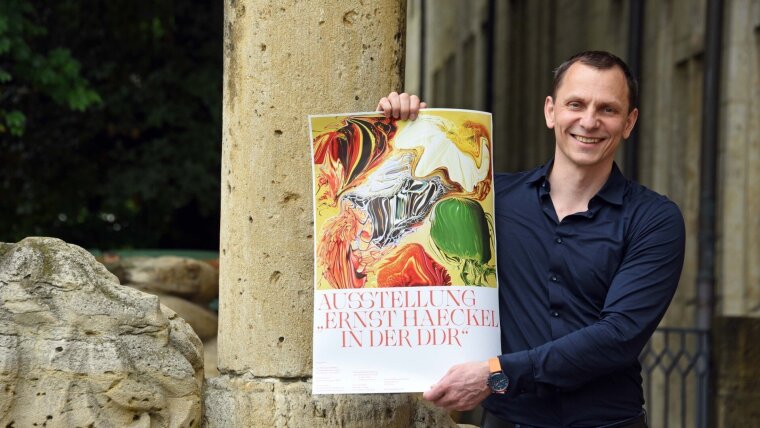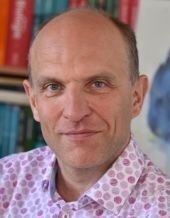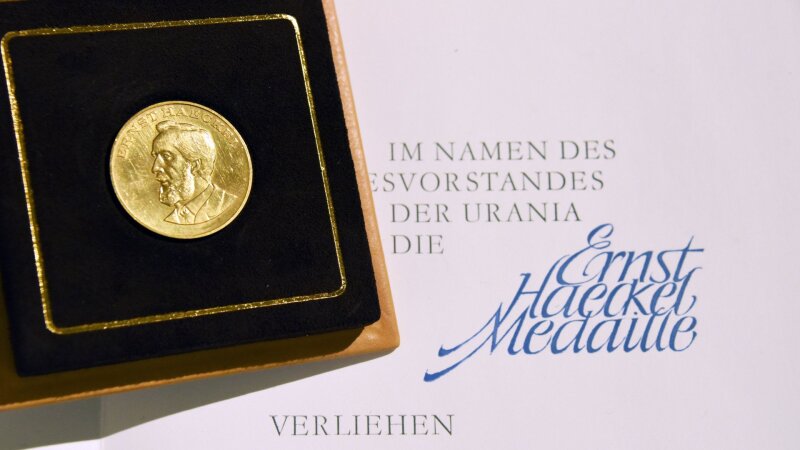
- Event
- Knowledge Transfer and Innovation
Published: | By: Angelika Schimmel
Ernst Haeckel (1834-1919) was regarded as the "German Darwin" and was both highly praised and controversial as an evolutionary researcher and university lecturer. And he was a scientist who used artistic funds to make his findings clear and understandable for everyone. However, his preoccupation with the family trees of life also led him to racial theory, which the National Socialists referred to in their racial ideology. At the same time, Haeckel's theory of evolution provided political strategists in the GDR with numerous arguments in favour of their materialistic beliefs.
"Ernst Haeckel was an extremely ambivalent figure who was instrumentalised for a wide variety of purposes," says Dr Karl Porges from Friedrich Schiller University Jena. Porges and his colleague apl. Prof. Dr Uwe Hoßfeld presented a comprehensive examination of Haeckel's reception in the GDR in 2023 with the book "Ernst Haeckel in der DDR"External link. With a small special exhibition, which opens on 5 June in the exhibition cabinet of the main university building, the scientists are adding new facets to Haeckel's "metabiography".
Ambivalence is the principle
Ambivalence seems to have characterised the life and thinking of the biologist and monist Haeckel. "Politically, Haeckel was just as much a part of the peace movement as he was of nationalism after the First World War," explains Porges. "At a time when it was not a matter of course for the population to participate in science and knowledge, Haeckel advocated the inclusion of the theory of evolution in school education. At the same time, he was critical of the working class and social democracy." However, the latter was partially ignored in the GDR. Just like Haeckel's thoughts on "racial hygiene". Instead, research ships were named after Haeckel, prizes bearing his name were awarded to talented young researchers and Jena institutions such as the Phyletic Museum and the Ernst Haeckel House were maintained as important places of remembrance.
In the GDR was honoured with Ernst Haeckel: In 1981, the Urania Society donated the Ernst Haeckel medal and certificate, which was considered the highest honour of the society. A medal and certificate can be seen in the new exhibition.
Image: Anne Günther (University of Jena)In the present day, however, the debate about Haeckel is often one-sided because it is only focussed on his thoughts on racial theory. "Haeckel was a racial theorist, but not a practitioner like the National Socialists later were," Porges points out. The biology didactics experts from Jena are therefore in favour of a differentiated view. "Our view at Haeckel will only become whole if we overcome the distorted images," says Porges.
Haeckel presented as a teacher, researcher and artist
The small special exhibition in the University Main Building offers an opportunity to do just that. Individual exhibits are on display here, which are exemplary for the six chapters of the book "Ernst Haeckel in der DDR". Original assignments for the Haeckel school-leaving examination from the GDR era represent Haeckel's educational ambitions, while a blueprint of the GDR fishing research vessel "Ernst Haeckel", which travelled the world's oceans with international crews, refers to Haeckel's marine and fisheries research.
Tamara Knapp from Weimar is responsible for the artistic part of the exhibition. "She has already designed the fascinating cover for our book. Now she is providing a poster for each chapter of the book that refers to Haeckel's life, work or research objects and creates surprising associations using funds from visual art and graphic design," says Karl Porges.
"The works are excerpts from archived and historical images of Haeckel's development. Based on the original images, I have extracted elements of the pictures using collage techniques, processed them further, alienated them or interpreted them further using graphic adaptation techniques in colour and form," says Tamara Knapp, explaining her approach. The resulting large-format paintings captivate the viewer with colourful plants that could be plants or sea creatures, or with imaginary creatures whose birth, growth and death become visible as if in fast motion. Tamara Knapp's works of art offer the viewer plenty of scope for their own interpretations and a new perspective on the seemingly familiar.
Opening hours
The exhibition on the book "Ernst Haeckel in der DDR" can be seen from 5 June to 5 July 2024 in the Exhibition Cabinet, University Main Building, Fürstengraben 1 in Jena. The exhibition is open Monday to Friday from 9 am to 6 pm.
Vernissage
The public opening event will take place on 5 June 2024 at 5 pm in Lecture Hall 24 of the University Main Building (Fürstengraben 1).
Programme:
- apl. Prof. Dr Uwe Hoßfeld "(Jena) repetitions/symmetries in nature"
- Dr Karl Porges "Ernst Haeckel in the GDR"
- Tamara Knapp "Technological Interferences of Natural Phenomenologies"
Am Steiger 3
07743 Jena Google Maps site planExternal link

Am Steiger 3
07743 Jena Google Maps site planExternal link
